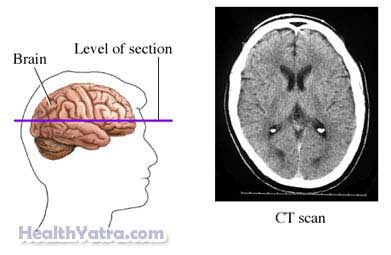Definition
A CT scan uses a x-rays and special computers to make pictures of the inside of the body. In this case, the images are of the head.

Reasons for Test
A CT scan is done to study your skull, brain, jaw, sinuses, and facial bones. It will look for signs of injuries, tumors, infections, or other diseases.
Your doctor may recommend a head CT if you have any of the following symptoms:
- Headache
- Seizures
- Head injury or injury to the face or eyes
- Dizziness or problems with balance
- Confusion
- Behavior or personality change
- Chronic nasal congestion
- Swelling in the face, head, or neck
Possible Complications
A chemical called contrast may be used to help improve the pictures. Some people can have an allergic reaction or develop kidney problems with contrast material. However, bad reactions are rare. Your doctor will review a list of possible complications of a CT scan with contrast.
A CT scan does use radiation. You and your doctor will weigh the harms and benefits of this test. A CT scan may not be advised if you are pregnant.
Be sure to discuss these risks with your doctor before the test.
What to Expect
Prior to Test
Your doctor may ask you to:
- Avoid eating or drinking anything for four hours before the test if contrast will be used.
- Remove any metal objects, such as jewelry, hearing aids, or dentures.
Description of the Test
If contrast is needed, it will be injected into a vein.
You will be positioned on a special moving table. The table will move slowly through the CT scanner. You will need to stay still during the entire test. The technician may need to use a device to keep your head still. As the scanner takes pictures, you will hear humming and clicking. You will be able to talk to the technician through an intercom.
After Test
If you had contrast, you may be asked to drink extra fluid. This will flush the contrast from your body.
How Long Will It Take?
About 10 minutes
Will It Hurt?
You may feel flushed if you are given contrast. You may also notice a salty or metallic taste in your mouth and feel nauseated.
Results
The CT images will be sent to a radiologist for analysis. Your doctor will receive the results and discuss them with you.
Call Your Doctor
If you were given contrast, call your doctor if any of the following occurs after the test:
- Hives
- Itching
- Nausea
- Swollen, itchy eyes
- Tightness of throat
- Difficulty breathing
In case of an emergency, call for medical help right away.
